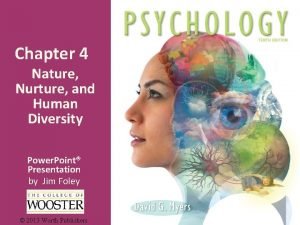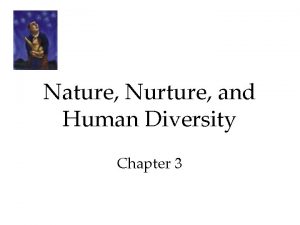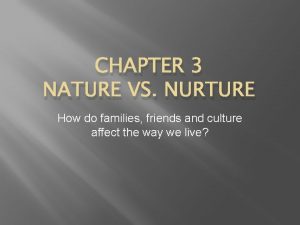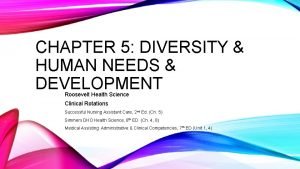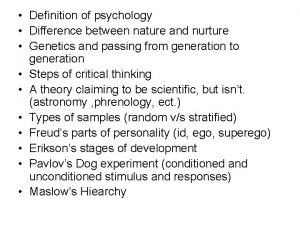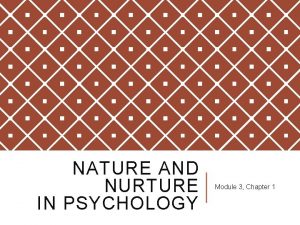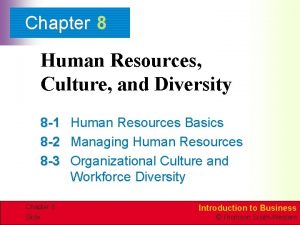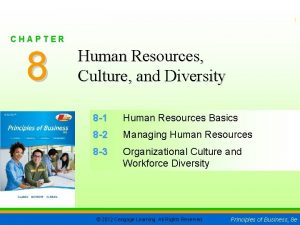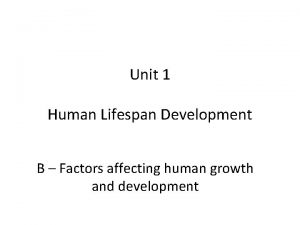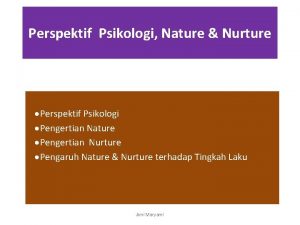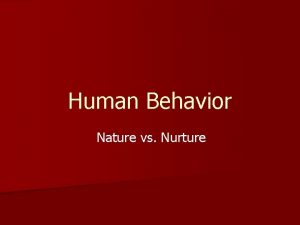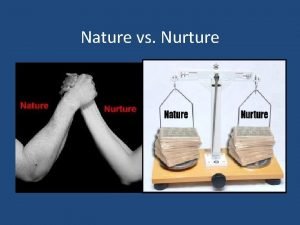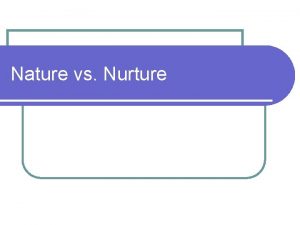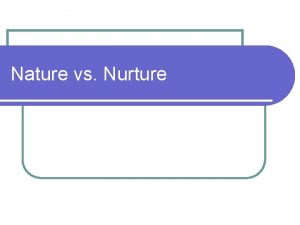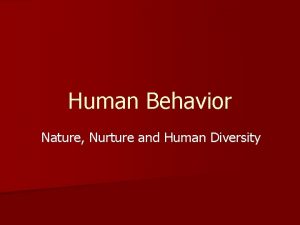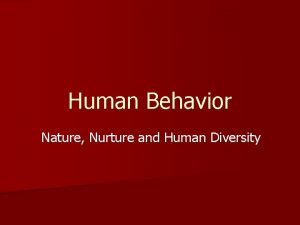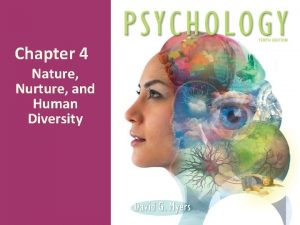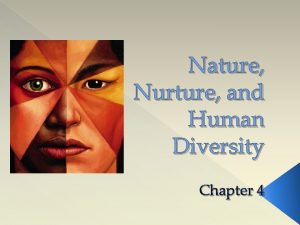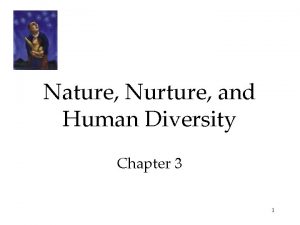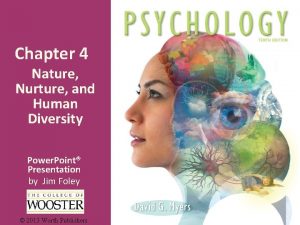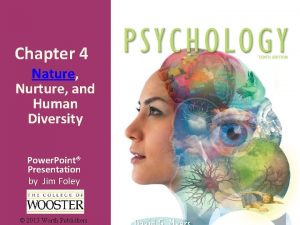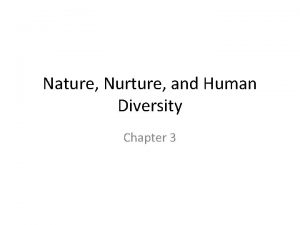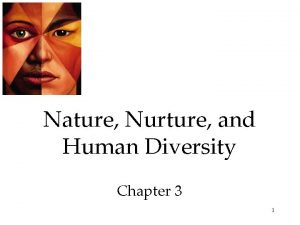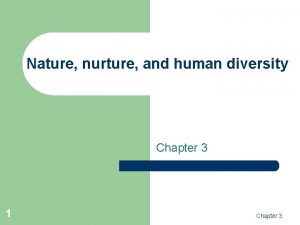Chapter 3 Nature Nurture and Human Diversity Nature
























- Slides: 24

Chapter 3 Nature, Nurture, and Human Diversity

Nature vs. Nurture • What is the nature vs. nurture controversy? • Give three examples of how “nature” has contributed to the person you have become. • Give three examples of how “nurture” has contributed to the person you have become. • Which do you feel contributes more to a child’s behavior?

Behavior Genetics: Predicting Individual Differences • Behavior Genetics is the study of our differences and the relative effects of heredity and environment on our individual differences in behavior & mental processes • Methods used: – Twin studies – Adoption studies – Temperament studies

Genes: Our Biological Blueprint • Chromosomes - threadlike structures made of DNA molecules that contain the genes. 23 from mom, 23 from dad = 46 • DNA - a complex molecule containing the genetic information that makes up the chromosomes. • Genes - Units of heredity that make up the chromosomes. Every human is close to being your clone, sharing 99. 9% of your DNA. • Genome – the complete instructions for making an organism.

Studies that support genetic influence: • Identical twins studies – show they are more alike than fraternal twins in abilities, personality traits & interests • Separated twin studies – show remarkable similarities in life choices of (Genes influence personality).

Studies that support genetic influence cont. : • Adoption Studies - show adoptees’ traits bear more similarities to their biological parents than their care-giving adoptive parents. • Temperament Studies - Temperament seems to be biologically based & tends to remain stable throughout life.

Twin Studies • Identical twins: single fertilized egg, 2 genetically identical organisms, natural human clone • Fraternal twins: separate fertilized eggs, no closer than older and younger brother or sister, but share the fetus

Twin Studies The Jim twins • Identical twins separated at birth for almost 40 years • First ever separated twin study (Bouchard) • After this many more twin studies, finding such shared traits as: – Tastes, physical attributes, interests, fears, personality • Identical twins raised together have more similar personalities

Adoption Studies • Creates 2 sets of relatives – biological & adoptive • For any given trait, we can study whether adopted children are more like biological parents (nature) or adoptive parents (nurture) • Studies prove personality traits don’t depend on environment • Parents do influence their children’s attitudes, values, manners, faith, and politics

Adoption Studies Adopted children thrive: • Homes have fewer family problems • Grow up to be more caring & altruistic • Score higher on intelligence tests than biological parents • Grow into happier & more stable adults

Temperament Studies • Temperament – a person’s characteristic level of emotional reactivity and intensity (examples - anxious, irritable, easy-going, reserved, etc. ) • Apparent soon after birth and continues relatively unchanged into adulthood • Compared with fraternal twins, identical twins may have similar temperaments – indicates temperaments may be biologically rooted

Heritability • The mathematical proportion of variation among people that we can attribute to genetic influence, not due to their environment • Heritability is a direct correlation – It has a coefficient from 0 to 1 (or 0% -100%) – The more heritable a disease or trait is, the more the differences between people can be associated with genetic variation. • Remember: The more similar the environment, the higher the percentage of heritability!

Heritability Example • Take four boys from different families. • From birth, put them in barrels, feed them through a tube, in exact same environment. • At age 12, release them from barrels and give them an IQ test. • Because their environment has been identically controlled, any differences in IQ scores are accounted for by genetics, making intelligence heritable.


Nature vs. Nurture • Influence of adaptation – adapting to our environment. • Nature and nurture work together • Genes are self-regulating – genes react differently to different environments • We all have a gene that can lead to depression if triggered by certain stress. • By itself, no depression, so it needs to be triggered. • Human differences result from nature & nurture – but some people might be more genetically predisposed to be more at risk than others for some disorders

Molecular Genetics • Subfield of biology that studies the molecular structure & function of genes • Goal is to find some of the many genes that influence normal human traits. • Geneticists try to find the genes that put people at risk for certain diseases • Prenatal screening • Pros and cons

Evolutionary Psychology • Evolutionary Psychologists study human nature through Darwin’s theory of Natural Selection – Focus mostly on what makes us alike as humans. – Goal is to understand human behavior that is universally aimed at the passing of one's genes into the next generation. • Natural Selection – the idea that the range of inherited traits that lead to increased reproduction & survival will most likely be passed on to succeeding generations.

Evolutionary Psychology • Certain biological & behavioral variations increase chances of reproducing, surviving, and contributing more offspring and future generations – Mutations - a random error in gene replication that leads to change • Then those new offspring are even more likely to survive. Thus, over time, population characteristics adapt and change, and the strongest traits are passed down • Dmitry Belyaev – Fox breeding

Evolutionary Psychology • Together, genes and experience wire the brain. • Our adaptive flexibility in responding to different environments contributes to our fitness – our ability to survive & reproduce. • Examples: • We fear dangerous animals • We fear the dark • We love our own children

Evolutionary Psychology • Behaviors that contribute to survival are found throughout cultures – Think about when you watch people interact how you can sometimes tell what people are talking about even if they are speaking a language you don’t know… • Emotions can be cross cultural • Understanding the difference between a smile and frown helped us to survive thousands and millions of years ago

Evolutionary Psychology – Gender Differences • Men & women genetically adapted same way over time, except in behaviors related to reproduction • Studies suggest men have a stronger tendency towards sex –more sex drive –more thoughts about sex –initiate sex more –more likely to perceive a women’s friendliness as a desire for sex

Evolutionary Explanation – Mating Preferences • Men are attracted to youthful, healthy fertile appearing women, smooth skin, youthful shape suggesting childbearing years. • Women attracted to mature, healthy-looking men, mature, dominant, bold, & affluent suggests capacity to support & protect. • Nature selects behaviors that increase the likelihood of sending one’s genes into the future.

Critiquing the Evolutionary Process • Often start with an effect and work backward to propose an explanation • Concerns about the social consequences of evolutionary psychology • Critics maintain that evolutionary psychologists underestimate cultural expectations and socialization.

Parents and Early Experiences
 Nature nurture and human diversity
Nature nurture and human diversity Nature nurture and human diversity
Nature nurture and human diversity Nature of nurture chapter 3
Nature of nurture chapter 3 Nature of nurture chapter 3
Nature of nurture chapter 3 Nature of nurture chapter 2
Nature of nurture chapter 2 Chapter 5 diversity and human needs and development
Chapter 5 diversity and human needs and development Examples of nature and nurture
Examples of nature and nurture Peer influence
Peer influence Nurture psychology definition
Nurture psychology definition Strengths and weaknesses of nature vs nurture
Strengths and weaknesses of nature vs nurture Identical twin studies
Identical twin studies Nature and nurture
Nature and nurture Nature versus nurture debate
Nature versus nurture debate Chapter 8 human resources culture and diversity
Chapter 8 human resources culture and diversity Chapter 8 study guide human resources culture and diversity
Chapter 8 study guide human resources culture and diversity Gesell theory
Gesell theory Nature vs nurture activities
Nature vs nurture activities Barbara herbert and daphne goodship
Barbara herbert and daphne goodship Danielle lierow
Danielle lierow Noah heller
Noah heller John locke nature nurture
John locke nature nurture Nature vs nurture
Nature vs nurture Chomsky nature vs nurture
Chomsky nature vs nurture Nature versus nurture debate
Nature versus nurture debate Nature dan nurture dalam psikologi
Nature dan nurture dalam psikologi

